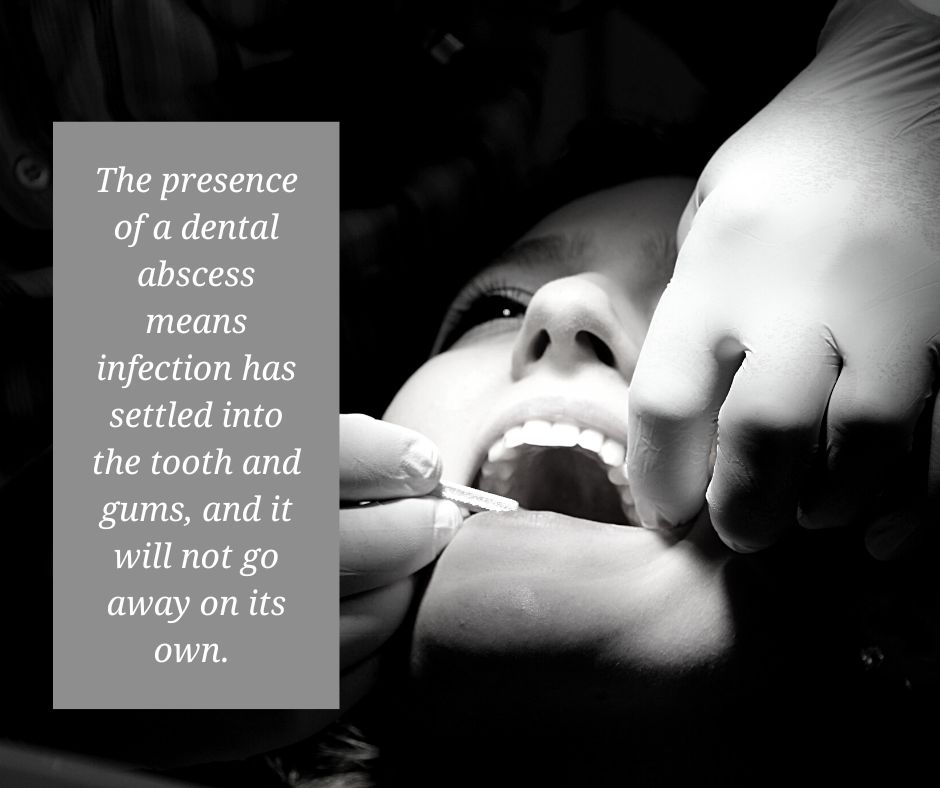If you have severe, throbbing tooth pain along with a pocket of pus near the base of your tooth, you should call a dentist right away. These are warning signs of a tooth abscess, which is a dangerous bacterial infection at the root of a tooth. If left untreated, an abscess could cause permanent damage to surrounding teeth, the jaw, and other parts of the body. It is important to learn the signs and causes of a tooth abscess in order to avoid potentially life-threatening conditions.
What Causes an Abscess on a Tooth?
According to researchers at Mount Sinai, an abscess may form if there is an unfilled cavity causing tooth decay, or a broken or chipped tooth. These conditions allow bacteria to make their way through the tooth’s protective enamel, past the soft layer of tissue called dentin, and into the pulp of the tooth. When that happens, an infection called pulpitis can settle in, resulting in pain and inflammation in the tooth and gums. Eventually, bacterial fluid forms a pocket of pus in the gums called an abscess.
Symptoms of a Tooth Abscess
One of the main indications of a tooth abscess is severe, persistent pain while chewing or biting down. There may also be a strong feeling of pressure, sensitivity to hot or cold temperatures, bad breath, swollen glands, and a fever.
Near the base of the infected tooth, patients will see swollen, inflamed gums along with a red bubble that’s filled with pus. In severe cases of tooth abscesses, swelling can extend into lymph nodes, the jaw and neck.
Can an Abscess Heal Itself?
The presence of a dental abscess means infection has settled into the tooth and gums, and it will not go away on its own. Unlike other types of bacterial illnesses that can be cured with antibiotics alone, a tooth abscess must also be medically treated to remove the infection.
A dentist will first need to drain the pus that has collected under the gums. In some cases, the pocket bursts on its own prior to a dental visit, but this does not mean the infection is gone. It is still important for a dentist to clean the site and examine what is causing the problem. Dental x-rays and other imaging tests will need to be taken to determine which tooth is infected and how far the infection has spread.

Often, a root canal must be performed to save the tooth. In this procedure, the dentist removes the infected nerves and blood vessels, then seals the tooth with a dental crown to protect it from further damage. If the dentist determines that the abscess has already done too much damage to be saved via a root canal, the tooth may need to be extracted.
What Complications Can Arise if an Abscess is Left Untreated?
The National Center for Biotechnology Information (NCBI) states that the prognosis for a dental abscess is generally very good when treated promptly. However, if left untreated, the mortality rate for patients can increase to 40%. This is because some severe dental abscess infections can extend into the chest cavity, affecting the airway; or into the sinuses and eventually reaching the brain. There is also a risk of abscesses spreading into the bloodstream, which can lead to sepsis.
While these situations are scary to think about, they are extremely rare. But it is important to keep them in mind when considering whether or not to seek dental treatment.
How Can I Prevent A Tooth Abscess?
While it is not always possible to avoid a dental abscess, there are ways to reduce the chances of infection making its way into the teeth.
Avoid sugary foods and drinks, particularly before bed
When sugar settles on the teeth, bacteria in the mouth eats it away – all the while releasing acids that destroy enamel. Without that protective enamel, bacteria can creep into the teeth and eventually cause decay in the form of cavities.
Practice good oral hygiene
Brush teeth twice a day for at least two minutes each time, and floss daily. Be sure to schedule a dental checkup and cleaning every six months to reduce plaque buildup.
Ask the dentist about fluoride treatment
Fluoride supports healthy tooth enamel and fights harmful bacteria in the mouth. According to the Centers for Disease Control, nearly 3 in 4 Americans who used public water supplies in 2016 drank water with enough fluoride to prevent tooth decay. But bottled water has become more popular in recent years, and the FDA does not require manufacturers to disclose how much fluoride is in bottled water. Since it is unclear if the water has enough fluoride, patients can ask a dentist whether their dental health could benefit from fluoride treatments.
Consider sealants for kids
Baby teeth have lots of grooves where food can get stuck, and combined with children’s brushing habits, that is a recipe for cavities. Dental sealants form a clear protective coating over the teeth to keep bacteria and acid out. Studies show that sealants can reduce tooth decay by as much as 70% over a five-year period, and that is a promising way to prevent tooth abscesses.
It Is Never Okay to Ignore Tooth Pain
Pain in the teeth and gums is a sign you should see a dentist. If ignored or simply masked with pain medicine, there is a risk of infection setting in or worsening. A dentist can identify whether your condition needs immediate treatment and fix the tooth before it leads to bigger issues.
If you are experiencing symptoms of a tooth abscess, contact a dentist right away. Use our online search tool to find the closest one in your area.


